The McCain-Feingold Act, officially known as the Bipartisan Campaign Reform Act of 2002 (BCRA), was a law aimed at reforming how money is used in U.S. elections. This law was created by Senators John McCain and Russ Feingold to stop big money from having too much influence on elections. It focused on banning “soft money” and controlling how political ads are used before elections.
Key Takeaways:
- The McCain-Feingold Act aimed to reform campaign finance by banning soft money contributions and enhancing transparency in federal elections.
- Key provisions include stricter regulations on electioneering communications and increased individual contribution limits to empower more citizen participation.
- Despite significant reforms, loopholes remain, prompting ongoing calls for amendments and new legislation to further limit the influence of money in politics.
Table of Contents
- The Scandals That Sparked the McCain-Feingold Act
- What Is the BCRA?
- Why Was the McCain-Feingold Act of 2002 Important?
- McCain-Feingold Act 2002: Regulation of Electioneering Communications
- McCain v. Feingold: Legal Challenges
- What Is the McCain-Feingold Act’s Legacy?
- Remaining Loopholes in the McCain-Feingold Act
- Summary: The Impact and Future of the McCain-Feingold Act
- Conclusion
- Frequently Asked Questions
The Scandals That Sparked the McCain-Feingold Act
The McCain-Feingold Act (also known as the Bipartisan Campaign Reform Act of 2002) was created because of growing concerns about the influence of money in politics during the 1990s. At the time, politicians could receive large, unregulated donations, known as soft money, which allowed wealthy individuals and groups to have a big impact on elections.
The 1996 Presidential Election
A key event that triggered this reform was the 1996 presidential election. During that election, both political parties raised a lot of soft money, and there were serious concerns about the role of foreign donations in U.S. campaigns.
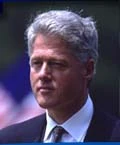
Bill Clinton served as the 42nd President of the United States from 1993 to 2001. His presidency was marked by strong economic growth, welfare reform, and efforts to balance the federal budget. Clinton’s administration presided over the longest peacetime economic expansion in U.S. history, with unemployment and inflation remaining low throughout much of his presidency.
The Clinton-Gore campaign was particularly criticized for accepting large amounts of soft money, some of which came from foreign sources, which violated U.S. laws.
In the 1996 presidential campaign, Gore faced scrutiny for his involvement in a controversial fundraiser at a Buddhist temple in California. This event, linked to the use of soft money, was later part of the broader debate around campaign finance reform, contributing to the momentum for the McCain-Feingold Act.
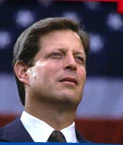
This scandal highlighted how money influenced elections and sparked public outcry for reform.
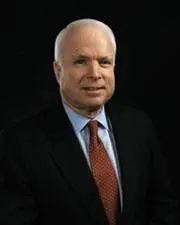
Senator John McCain served in the U.S. Senate for over three decades, representing Arizona from 1987 until he died in 2018. A former Navy pilot and Vietnam War veteran, McCain built his political career on a reputation for independence, military service, and a commitment to campaign finance reform.
Senators John McCain and Russ Feingold took the lead in pushing for change.
Senator Russ Feingold served as a U.S. Senator from Wisconsin from 1993 to 2011. A member of the Democratic Party, Feingold was known for his commitment to progressive values, campaign finance reform, and his willingness to take principled stands on issues, even when they were unpopular.
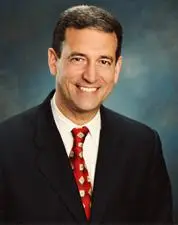
The Keating Five Incident
McCain, in particular, was motivated by his own experience in the Keating Five scandal in the late 1980s, where he was accused of improper conduct involving a savings and loan company. This made him even more determined to fix the campaign finance system.
With these concerns driving them, McCain and Feingold worked together to create the McCain-Feingold Act, which aimed to limit the impact of big money in U.S. elections.
Soft money refers to donations to political parties that aren’t regulated by federal election laws. Before this act, large amounts of money could be given to political parties, which often influenced the outcome of federal elections. The McCain-Feingold Act wanted to put a stop to this by making sure that the election process was more transparent and fair.
What Is the BCRA?
The Bipartisan Campaign Reform Act (BCRA), or the McCain-Feingold Act, had several key goals. One of the most important was banning soft money contributions to national political parties. Soft money is often used for “party-building” activities but can indirectly support specific candidates.
Additionally, the BCRA regulated electioneering communications. These are ads that mention a candidate for federal office and are broadcast close to an election. The law required those paying for the ads to disclose where their funding came from, which helped increase transparency.
Why Was the McCain-Feingold Act of 2002 Important?
The McCain-Feingold Act of 2002 was important because it tried to reduce the power of money in politics. Before the law, wealthy individuals, corporations, and unions could spend large sums of money to influence elections without many restrictions. By banning soft money and regulating ads, the law sought to make elections more equal and give regular citizens a bigger voice.
However, the law didn’t solve everything. There were still loopholes, and some groups found ways to bypass the new rules, leading to future legal challenges.
McCain-Feingold Act 2002: Regulation of Electioneering Communications
One of the major changes brought by the McCain-Feingold Act of 2002 was the regulation of electioneering communications. These are ads that mention a federal candidate and are broadcast close to an election—within 30 days of a primary or 60 days of a general election.
Before this law, large organizations, like corporations and unions, could pay for these ads using money that wasn’t subject to campaign finance laws. This allowed them to influence elections without full disclosure of their funding. The McCain-Feingold Act prohibited these groups from using their general funds to pay for electioneering ads. Instead, they could only finance these ads through Political Action Committees (PACs), which had stricter rules.
The goal of this regulation was to make sure that voters knew who was behind the ads they saw during the critical time before an election and to limit the influence of big money in politics.
McCain v. Feingold: Legal Challenges
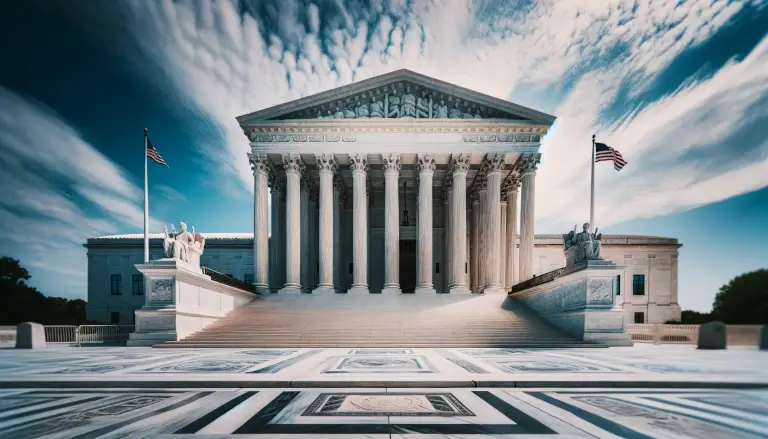
Even though the McCain-Feingold Act was a major step forward in reforming campaign finance, it faced several legal challenges. Two important Supreme Court cases—Citizens United v. Federal Election Commission and McCutcheon v. Federal Election Commission—significantly weakened parts of the law.
Citizens United v. FEC
In 2010, the Supreme Court ruled in Citizens United v. Federal Election Commission that corporate spending on elections is protected as free speech under the First Amendment. This decision allowed corporations, unions, and other organizations to spend unlimited money on election ads, as long as they didn’t directly donate to a candidate’s campaign.
This ruling changed the way campaigns are financed. After the Citizens United decision, corporations and unions could use their funds to support or attack candidates, leading to a huge increase in political spending.
McCutcheon v. FEC
In 2014, the Supreme Court ruled in McCutcheon v. Federal Election Commission that the total limit on how much an individual could donate to candidates and political committees during an election cycle was unconstitutional. The court argued that this limit violated free speech.
Before this case, there was a cap on how much a person could give in total during an election. After the ruling, individuals could donate to as many candidates and committees as they wanted, further increasing the role of money in elections.
What Is the McCain-Feingold Act’s Legacy?
The McCain-Feingold Act aimed to make elections fairer by limiting the influence of large sums of money. It made key changes, such as banning soft money contributions and regulating election ads. However, with Supreme Court decisions like Citizens United and McCutcheon, some of these changes were weakened.
Still, the McCain-Feingold Act is an important piece of legislation. It was one of the most significant efforts to reform campaign finance in decades, and it continues to influence how campaigns are financed today.
Remaining Loopholes in the McCain-Feingold Act
Even though the McCain-Feingold Act made significant changes to campaign finance, it didn’t close all the loopholes. For instance, 527 groups—named after a section of the tax code—can raise and spend unlimited amounts of money on activities like voter mobilization and issue advocacy. These groups don’t directly support or oppose a candidate, so they are not bound by the same rules as campaigns or political parties.
Additionally, the law does not cover independent expenditures made by outside groups that are not coordinated with candidates or parties. This means that wealthy individuals and organizations can still spend large sums of money on ads or other activities that influence elections, as long as they don’t work directly with a candidate’s campaign.
Another gap is that electioneering communications are only regulated during the 30 or 60-day windows before elections. Outside of those periods, corporations and unions can run ads without disclosing their funding sources.
Proposed Reforms and Future Amendments
To address the loopholes in the McCain-Feingold Act, some lawmakers and advocacy groups have proposed new reforms. One of the most well-known proposals is the DISCLOSE Act. This law would require organizations that spend money on elections to reveal their donors. The goal is to increase transparency so voters know who is funding political ads.
Other proposed reforms include public financing of elections, which would provide candidates with government funds to run their campaigns. This would reduce their reliance on wealthy donors and special interest groups. Additionally, some groups are advocating for a constitutional amendment to overturn the Citizens United decision and make it clear that spending money on elections is not the same as free speech.
These reforms aim to reduce the influence of money in politics and make elections more fair and transparent.
Summary: The Impact and Future of the McCain-Feingold Act
The McCain-Feingold Act was a landmark effort to reform campaign finance and reduce the influence of big money in U.S. elections. It banned soft money, regulated election ads, and tried to make elections fairer and more transparent. However, court rulings like Citizens United and McCutcheon have weakened some of the law’s key provisions, allowing more money to flow into politics.
While the McCain-Feingold Act is still important, more reforms are needed to address the remaining loopholes and ensure that U.S. elections remain fair and open to all citizens.
Conclusion
The McCain-Feingold Act of 2002 was a landmark piece of legislation that aimed to make elections more transparent and fair by limiting the influence of large sums of money. Despite its impact, the law has faced challenges from court rulings and loopholes that still allow money to play a large role in politics. Future reforms like the DISCLOSE Act and public financing of campaigns could address these gaps and further reduce the power of money in U.S. elections.
Frequently Asked Questions
What is the McCain-Feingold Act?
The McCain-Feingold Act, also known as the Bipartisan Campaign Reform Act (BCRA), is a 2002 law that aimed to reduce the influence of money in U.S. elections. It banned soft money donations to political parties and regulated electioneering communications—ads that mention a federal candidate close to an election.
What is soft money, and why was it banned?
Soft money refers to donations to political parties that are not subject to federal limits. These funds were often used to indirectly support candidates in federal elections. The McCain-Feingold Act banned soft money to prevent wealthy individuals and organizations from having too much influence on elections.
What is the BCRA?
The Bipartisan Campaign Reform Act (BCRA), also known as the McCain-Feingold Act, is a law passed in 2002 that reformed how money is used in elections. It targeted soft money and regulated political ads to increase transparency and reduce the influence of large donors.
What were the key Supreme Court rulings that challenged the McCain-Feingold Act?
Two major Supreme Court rulings—Citizens United v. FEC and McCutcheon v. FEC—challenged the McCain-Feingold Act. Citizens United allowed corporations and unions to spend unlimited money on political ads, while McCutcheon removed the overall limit on how much an individual could donate to candidates and committees during an election cycle.

Hello.This post was really motivating, particularly since I was investigating for thoughts on this subject last week.
I know this if off topic but I’m looking into starting my own blog and was wondering what all is needed to get set up? I’m assuming having a blog like yours would cost a pretty penny? I’m not very internet savvy so I’m not 100 sure. Any recommendations or advice would be greatly appreciated. Thanks